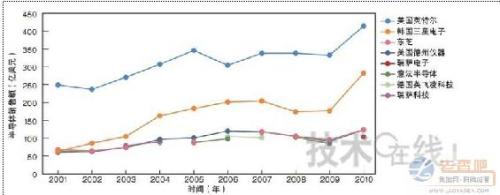 According to data from the ranking of semiconductor sales in the United States published by Gartner (fast track) in 2010, Intel has maintained the championship for 19 consecutive years since 1992. However, the gap between it and the second South Korean Samsung Electronics has gradually narrowed, and it is possible that it will be overtaken in a few years.
According to data from the ranking of semiconductor sales in the United States published by Gartner (fast track) in 2010, Intel has maintained the championship for 19 consecutive years since 1992. However, the gap between it and the second South Korean Samsung Electronics has gradually narrowed, and it is possible that it will be overtaken in a few years. Samsung's NAND flash memory business is expected to achieve high growth in the background of the rapid spread of smart phones and tablet terminals. In addition, the company manufactures system LSIs for Toshiba OEM, and has also strengthened its strength in the silicon foundry business. If Intel cannot completely get rid of the business system that relies on personal computers, the gap between the two companies will continue to narrow in the future.
As can be seen from the rankings of the recent years, the sales of the top two have significantly increased, and the third to fifth places have remained basically unchanged. Toshiba has been ranked third for four consecutive years since 2007. In 2010, Texas Instruments ranked fourth in the US for the slightest weakness ranked in the top five for many years. Renesas Electronics, the new company formed by the merger of Renesas Technology and NEC Electronics, ranked fifth.
Not among Gartner's rankings but as the "hidden third place" is the largest silicon foundry company Taiwan Semiconductor Manufacturing Co. (TSMC). Because TSMC’s 2010 sales forecast was 416.4 billion to 418.4 billion TWD, according to the exchange rate of 1 US dollar = 30 TWD in December 2010, 13.8 billion to 13.95 billion 500,000 US dollars, exceeding the third place. Toshiba. (Kimura Masahiro)
The picture shows the top five sales of semiconductor sales charts the top five sales for each year. Samsung Electronics is keeping up with Intel, which has been ranked first for years. Data provided by Gartner. From 2001 to 2009, it was the actual performance value, and 2010 was the speed report value.
